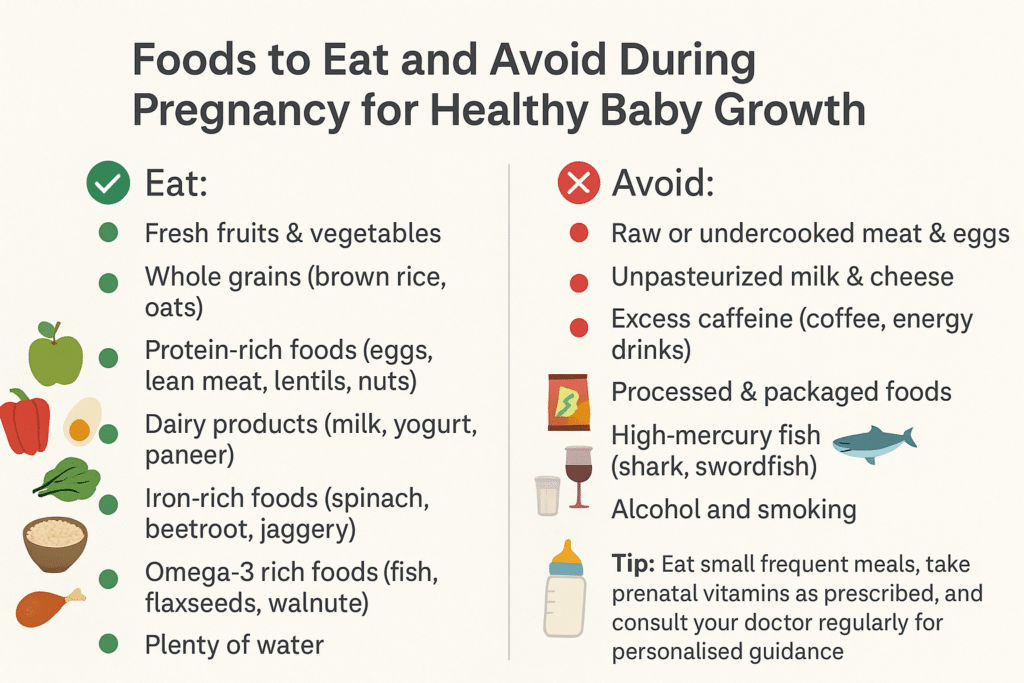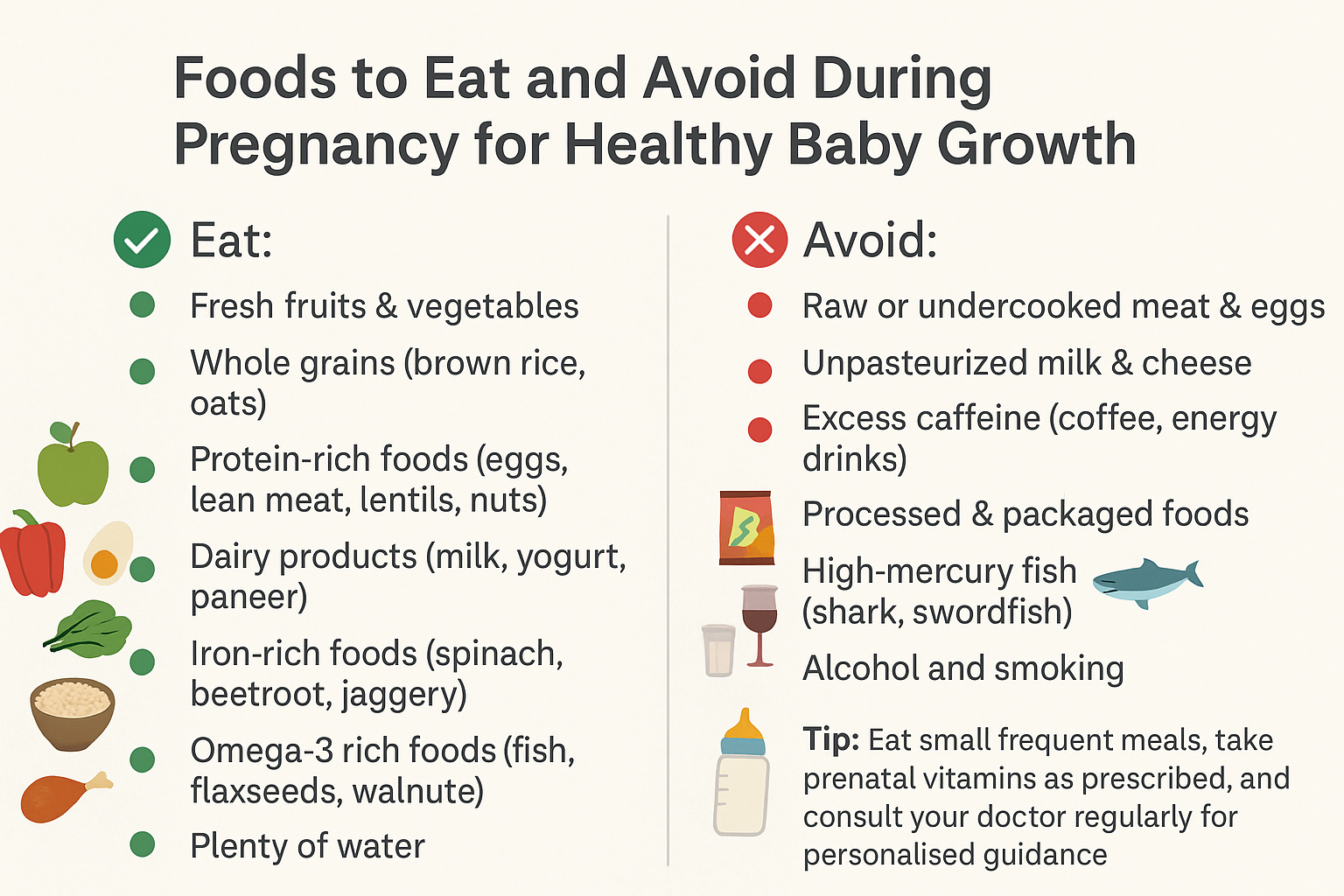Today we will know Foods to Eat and Avoid During Pregnancy for Healthy Baby Growth . Hope that it will be very helpful . Don`t forget to comment about it after reading this post .
Foods to Eat and Avoid During Pregnancy for Healthy Baby Growth

Pregnancy is a beautiful journey that demands special attention to your diet and lifestyle. The food you eat becomes the primary source of nutrition for your growing baby. Eating the right foods can boost healthy fetal development, while avoiding certain foods prevents complications.
This post will guide you in detail on:
- The importance of nutrition in pregnancy
- Foods to eat for healthy baby growth
- Foods to avoid during pregnancy
- Practical daily diet tips for pregnant mothers
Let’s dive in.
🌸 Importance of Nutrition in Pregnancy
Your baby’s growth and organ development entirely depend on your nutritional intake. A balanced pregnancy diet:
- Supports brain development
- Reduces risk of birth defects
- Promotes healthy birth weight
- Strengthens your immunity and energy levels
Neglecting proper nutrition may lead to preterm birth, low birth weight, or developmental delays. Therefore, mindful eating is not just for you – it directly impacts your baby’s lifelong health.
✅ Foods to Eat During Pregnancy :
Here are essential foods to include in your daily pregnancy meals:
1. Folic Acid-rich Foods
Folic acid prevents neural tube defects in babies. Include:
- Dark leafy greens (spinach, kale, mustard greens)
- Fortified cereals
- Lentils and beans
- Citrus fruits (oranges, sweet lime)
Tip: Aim for 600-800 mcg of folic acid daily, through food and supplements as advised by your doctor.
2. Iron-rich Foods
Iron supports blood production, preventing anaemia and fatigue. Eat:
- Lean red meat
- Chicken and fish (well-cooked)
- Eggs
- Beans and lentils
- Spinach and beetroot
- Combine iron-rich foods with Vitamin C sources (like lemon or amla) to improve absorption.
3. Calcium-rich Foods
Calcium builds your baby’s bones, teeth, heart, and muscles. Add:
- Dairy products (milk, paneer, curd)
- Ragi (finger millet)
- Almonds and sesame seeds
- Tofu
- Broccoli and kale
You need about 1000-1200 mg of calcium daily during pregnancy.
4. Protein-rich Foods
Protein aids baby’s tissue growth, especially the brain. Include:
- Eggs
- Chicken, fish (avoid mercury-rich fish)
- Paneer and tofu
- Dal, sprouts, chickpeas
- Nuts and seeds
Ensure 60-75 grams of protein daily, depending on your body weight and doctor’s advice.
5. Omega-3 Fatty Acids
Omega-3s, particularly DHA, support fetal brain and eye development. Eat:
- Flaxseeds and chia seeds
- Walnuts
- Fish like salmon and sardines (low-mercury, cooked properly)
- Omega-3 fortified eggs
If vegetarian, consider an algal oil DHA supplement after medical consultation.
6. Fibre-rich Foods
Pregnancy hormones slow digestion, causing constipation. Fibre keeps your gut healthy.
- Whole grains (oats, brown rice, whole wheat)
- Vegetables like beans, peas, carrots, broccoli
- Fruits like guava, apples, pears, oranges
- Nuts and seeds
Drink plenty of water along with fibre to avoid bloating.
7. Healthy Fats
Healthy fats aid brain and nervous system development.
- Avocado
- Nuts (almonds, walnuts)
- Seeds (flax, sunflower, pumpkin)
- Olive oil, coconut oil
Avoid trans fats found in packaged and fried foods.
8. Hydrating Foods
Proper hydration maintains amniotic fluid levels and blood circulation.
- Water (at least 2.5-3 litres daily)
- Coconut water (natural electrolyte)
- Fresh homemade fruit juices
- Buttermilk and lemon water
9. Vitamin D Sources
Vitamin D regulates calcium absorption and immunity.
- Fortified dairy and cereals
- Eggs
- Safe sun exposure for 15-20 minutes daily
Consult your doctor for Vitamin D supplementation if needed.
Sample Pregnancy Diet Plan
Here is a sample meal plan to include these foods:
- Early Morning – Soaked almonds + warm water with lemon
- Breakfast – Vegetable stuffed paratha with curd OR oats with milk and fruits
- Mid-morning Snack – Seasonal fruits or coconut water
- Lunch – Brown rice, dal, spinach sabzi, salad
- Evening Snack – Roasted chana or sprouts chaat + herbal tea
- Dinner – Roti with paneer/ chicken curry + mixed vegetable sabzi + salad
- Bedtime – A glass of warm milk with turmeric
Customise your meals as per your doctor or dietitian’s advice.
🚫 Foods to Avoid During Pregnancy
Some foods can harm your baby’s growth or cause infections. Avoid the following:
- Raw or Undercooked Meat, Eggs, and Fish
They can carry bacteria or parasites causing food poisoning, listeriosis, or toxoplasmosis.
- High-mercury Fish
Avoid shark, swordfish, king mackerel, and tilefish due to mercury, which harms fetal brain development.
- Unpasteurized Dairy Products
They can contain listeria, leading to miscarriage or stillbirth. Always consume pasteurized milk, cheese, and curd.
- Raw Sprouts
Raw sprouts (like alfalfa, moong) may carry bacteria. Cook them thoroughly before eating.
- Excess Caffeine
Limit to 200 mg caffeine daily (about 1-2 cups of coffee). Excessive caffeine increases miscarriage or low birth weight risk.
- Alcohol
Strictly avoid alcohol. It can cause fetal alcohol syndrome, affecting brain and physical development.
- Processed and Junk Foods
Chips, instant noodles, packaged snacks contain high sodium, unhealthy fats, and preservatives that affect baby’s growth and maternal health.
- Papaya and Pineapple (in excess)
Unripe papaya contains latex which may trigger uterine contractions. Large quantities of pineapple contain bromelain that can soften cervix tissues. Occasional moderate intake of ripe pineapple is considered safe by many, but consult your doctor based on your condition.
- Artificial Sweeteners
Some artificial sweeteners (like saccharin) cross the placenta. Limit use and prefer natural sweeteners like jaggery or honey (pasteurised) in moderation.
📝 Practical Tips for a Healthy Pregnancy Diet
✔ Eat small, frequent meals to manage nausea and maintain blood sugar.
✔ Choose home-cooked, freshly prepared foods.
✔ Wash fruits and vegetables thoroughly to remove pesticides.
✔ Do not skip meals – baby’s growth needs constant nutrition.
✔ Consult your gynaecologist before taking any supplements.
✔ Stay active with light exercises or prenatal yoga as advised.
✔ Listen to your body’s hunger and fullness cues.
❤ Final Thoughts
Eating healthy during pregnancy does not mean eating for two in quantity, but eating mindfully for two in quality. Each bite should provide nourishment for your baby’s brain, bones, and overall development. Avoiding harmful foods is equally important to prevent infections and complications.
Always consult your doctor or a qualified prenatal nutritionist before making major dietary changes. Every pregnancy is unique, and personalised guidance ensures the safest journey for you and your baby.
If you found this post helpful, share it with expecting mothers and bookmark it for your pregnancy nutrition journey. For detailed weekly pregnancy diet charts, message or comment below.
Learn More :
10 Early Signs of Pregnancy Every Woman Should Know
To know more Click Here – Youtube

